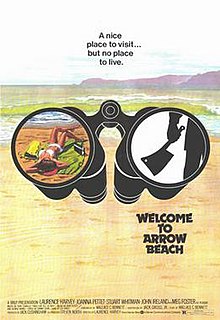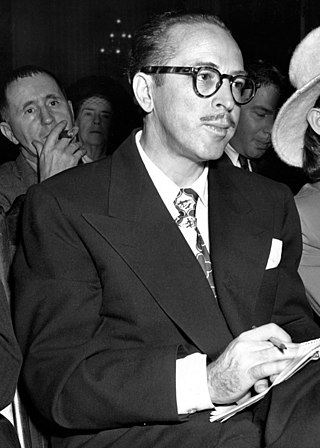
James Dalton Trumbo was an American screenwriter who scripted many award-winning films, including Roman Holiday (1953), Exodus, Spartacus, and Thirty Seconds Over Tokyo (1944). One of the Hollywood Ten, he refused to testify before the House Un-American Activities Committee (HUAC) in 1947 during the committee's investigation of alleged Communist influences in the motion picture industry.
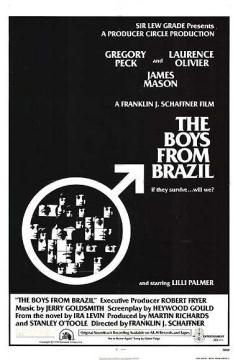
The Boys from Brazil is a 1978 thriller film directed by Franklin J. Schaffner. It stars Gregory Peck and Laurence Olivier, and features James Mason, Lilli Palmer, Uta Hagen, Anne Meara, Denholm Elliott, and Steve Guttenberg in supporting roles. The film is a British-American co-production, based on the 1976 novel of the same title by Ira Levin. It was nominated for three Academy Awards.

Laurence Harvey was a Lithuanian-born British actor and film director. He was born to Lithuanian Jewish parents and emigrated to South Africa at an early age, before later settling in the United Kingdom after World War II. In a career that spanned a quarter of a century, Harvey appeared in stage, film and television productions primarily in the United Kingdom and the United States.

Night Watch is a 1973 mystery thriller film directed by Brian G. Hutton from a screenplay by Tony Williamson, based on the 1972 play of the same name by Lucille Fletcher. The film reunited Elizabeth Taylor with co-star Laurence Harvey from their 1960 collaboration BUtterfield 8. It was the last time the pair acted together on screen. Some of the story elements recall the plot outline of the 1944 film Gaslight.

Embassy Pictures Corporation was an American independent film production and distribution studio, active from 1942 to 1986. Embassy was responsible for films such as The Graduate, The Producers, The Fog, The Howling, Escape from New York, and This Is Spinal Tap, Swamp Thing, and television series such as The Jeffersons, One Day at a Time and The Facts of Life.
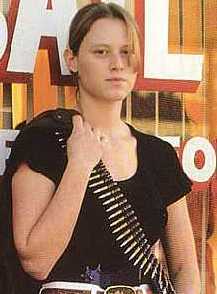
Domino Harvey was an English bounty hunter in the United States. She came from a well-to-do background, being the daughter of noted actor Laurence Harvey and fashion model Paulene Stone. Harvey's fame was increased posthumously by the 2005 release of the film Domino, which was loosely based on her life, in which Harvey was portrayed by Keira Knightley.

Coffy is a 1973 American blaxploitation film written and directed by Jack Hill. The story is about a black female vigilante played by Pam Grier who seeks violent revenge against a heroin dealer responsible for her sister's addiction.

Mary Lynn Carlin is a former American actress. She is best known for her debut role in the film Faces (1968), for which she was nominated for an Academy Award.
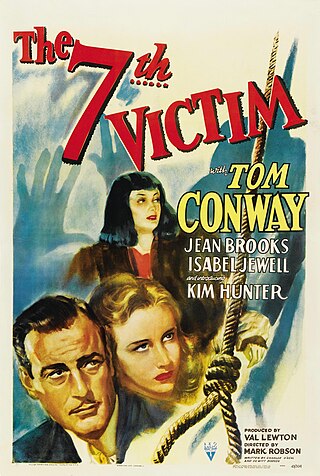
The Seventh Victim is a 1943 American horror film directed by Mark Robson, and starring Tom Conway, Jean Brooks, Isabel Jewell, Kim Hunter, and Hugh Beaumont. Written by DeWitt Bodeen and Charles O'Neal, and produced by Val Lewton for RKO Radio Pictures, the film focuses on a young woman who stumbles on an underground cult of devil worshippers in Greenwich Village, New York City, while searching for her missing sister. It marks Robson's directorial debut, and was Hunter's first onscreen role.
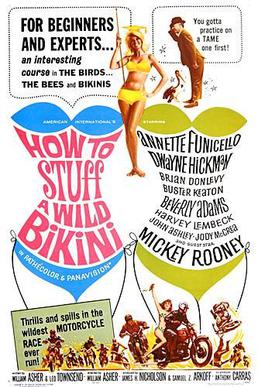
How to Stuff a Wild Bikini is a 1965 Pathécolor beach party film from American International Pictures. The sixth entry in a seven-film series, the movie features Mickey Rooney, Annette Funicello, Dwayne Hickman, Brian Donlevy, and Beverly Adams. The film features a brief appearance by Frankie Avalon and includes Buster Keaton in one of his last roles.

Ghost in the Invisible Bikini is a 1966 American fantasy comedy film. It is the seventh and last of American International Pictures' beach party films. The film features the cast cavorting in and around a haunted house and the adjacent swimming pool.

The Wonderful World of the Brothers Grimm is a 1962 American fantasy film directed by Henry Levin and George Pal. The latter was the producer and also in charge of the stop motion animation. The film was one of the highest-grossing films of 1962. It won one Oscar and was nominated for three additional Academy Awards. The cast included several prominent actors—including Laurence Harvey, Karlheinz Böhm, Jim Backus, Barbara Eden and Buddy Hackett.

King Richard and the Crusaders is a 1954 American historical drama based on Sir Walter Scott's The Talisman made by Warner Bros. The film stars Rex Harrison, Virginia Mayo, George Sanders and Laurence Harvey, with Robert Douglas, Michael Pate and Paula Raymond. It was directed by David Butler and produced by Henry Blanke from a screenplay by John Twist based on Sir Walter Scott's 1825 novel The Talisman. The music score was by Max Steiner and the cinematography by J. Peverell Marley. This was Warner Bros.' first essay into CinemaScope. King Richard and the Crusaders was listed in the 1978 book The Fifty Worst Films of All Time.
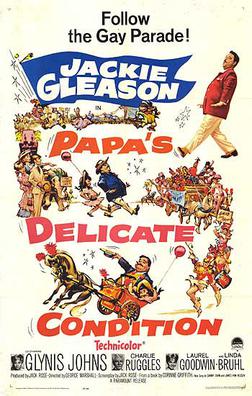
Papa's Delicate Condition is a 1963 American comedy film starring Jackie Gleason and Glynis Johns. It was an adaptation of the Corinne Griffith memoir of the same name, about her father and growing up in Texarkana, Texas. Jimmy Van Heusen (music) and Sammy Cahn (lyrics) won an Academy Award for Best Original Song for "Call Me Irresponsible".

Of Human Bondage is a 1964 British drama film directed by Ken Hughes and starring Kim Novak and Laurence Harvey in the roles played by Bette Davis and Leslie Howard three decades earlier in the original film version. This MGM release, the third screen adaptation of W. Somerset Maugham's 1915 novel, was written by Bryan Forbes from the novel by Somerset Maugham.

Bluebeard is a 1972 mystery comedy drama film written and directed by Edward Dmytryk and starring Richard Burton, Raquel Welch, Joey Heatherton, and Sybil Danning.

Rimfire is a 1949 American Western film directed by B. Reeves Eason. It is a noir Western.

Arash Amel is a Welsh-Iranian screenwriter and film producer.
Brut Productions was a film production company that was an offshoot of Fabergé cosmetics under George Barrie.

House of Darkness is a 1948 British film. It was directed by Oswald Mitchell.
